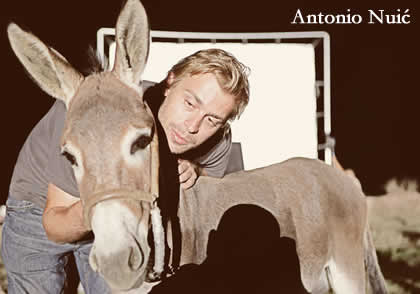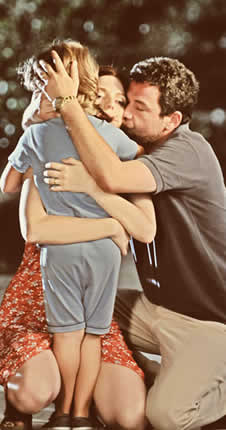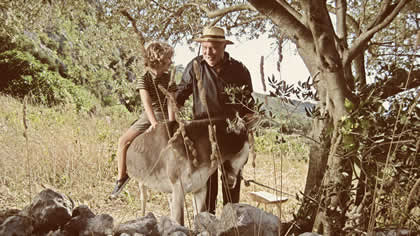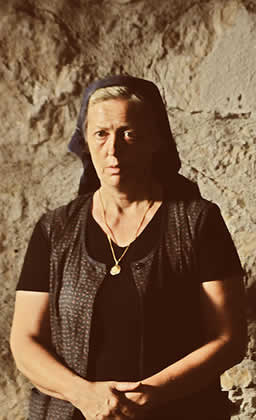 DONKEY takes place in the sweltering summer of 1995 as Croatian army forces complete operations that would end the civil war. A troubled relationship is revealed as Boro (Nebojsa Glogovac) drives his irritated wife, Jasna (Natasa Janjic), and their 6-year-old son, Luka (Roko Roglic), from Zagreb to Drinovci, the remote Herzegovinian village where Boro was born.
DONKEY takes place in the sweltering summer of 1995 as Croatian army forces complete operations that would end the civil war. A troubled relationship is revealed as Boro (Nebojsa Glogovac) drives his irritated wife, Jasna (Natasa Janjic), and their 6-year-old son, Luka (Roko Roglic), from Zagreb to Drinovci, the remote Herzegovinian village where Boro was born.
It has been seven years since their last visit, and when the dysfunctional clan arrives in Drinovci, it becomes clear where Boro’s uncommunicative, patriarchal attitudes come from. Boro hasn’t spoken to his equally stubborn father Pasko in quite some time. Boro’s wheelchair-bound refugee brother Pero (Emir Hadzihafizbegovic), who lived in Sarajevo and was crippled by a grenade, now lives with their father. Boro’s uncle Ante expects to be waited on hand-and-foot by his wife Ljuba, for whom he rarely has a kind word.
Pero tries to help Boro in his relationships with his wife and father. But, it is an actual donkey that ends up playing the role of peacemaker. In spite of the stubbornness that affects more than a father and son, an ambition arises to end decades of family conflict.
Writer / Director Antonio Nuić was born in Sarajevo in 1977. He graduated in film and TV directing from the Academy of Dramatic Arts in Zagreb. He is a member of the Croatian Film Directors Society. DONKEY is his second feature film. In 1998, his first short film, ON THE SPOT, won awards at the Croatian Student Film Festival FRKA for Best Film, Best Screenplay, and Audience Choice Award. His TV drama, GIVE THEM DINAMO BACK, won the Audience Award at the festival as well. From 1999-2004, Antonio directed TV shows, music videos and the short film, SEX, BOOZE AND SHORT FUSE. In 2006, ALL FOR FREE, his first feature length film, won the Great Golden Arena for best movie, Golden Arena for best director, Golden Arena for best screenplay and Golden Arena for best female supporting role in the Pula Film Festival. Other accolades include: Heart of Sarajevo for best male leading role in Sarajevo Film Festival, Special Jury Award in New Author Festival in Belgrade and Bronze Rosa Camuna in Bergamo. After directing TV commercials and promotional videos, Antonio’s DONKEY won the following awards at the Pula Film Festival: Golden Arena for best screenplay, Golden Arena for best photography, Golden Arena for best music and the Oktavijan- (Croatian Film Critics Society Award).
BOOZE AND SHORT FUSE. In 2006, ALL FOR FREE, his first feature length film, won the Great Golden Arena for best movie, Golden Arena for best director, Golden Arena for best screenplay and Golden Arena for best female supporting role in the Pula Film Festival. Other accolades include: Heart of Sarajevo for best male leading role in Sarajevo Film Festival, Special Jury Award in New Author Festival in Belgrade and Bronze Rosa Camuna in Bergamo. After directing TV commercials and promotional videos, Antonio’s DONKEY won the following awards at the Pula Film Festival: Golden Arena for best screenplay, Golden Arena for best photography, Golden Arena for best music and the Oktavijan- (Croatian Film Critics Society Award).
Bijan Tehrani: How did you come up with the story of Donkey? Are the characters of the film based on real people you know?
Antonio Nuić: All the characters in the film are loosely based on real people I know, since everything takes place in the village where my father was born. In the film, there is a part about trading the donkeys with Italians and that part is based on the events that actually occurred in the summer of 1995, when the film takes place. A cousin of mine told me the story and I instantly thought that it would be a great film idea. I was already working on a story that involved father- son problems, and when I heard that anecdote, I decided to glue the pieces together.
BT: Do you believe that most people who suffer from their parent’s abuses and mistakes in life go on to repeat those behaviors? Is Boro a character like that?
AN: Yes, I believe that is true. I saw it happen many times. It is almost as if it is the greatest curse of human history, same mistakes being repeated over and over again. And the majority of those mistakes tend to happen within the family circle.
 BT: Does Jesna, Boro’s wife represent modern women of Croatia? If she does, why does she puts up with abuses of Boro?
BT: Does Jesna, Boro’s wife represent modern women of Croatia? If she does, why does she puts up with abuses of Boro?
AN: Jasna represents a certain amount of Croatian women that wanted to be both modern and traditional at the same time, to nurture traditional family values, be highly educated and, accordingly, have a decently paying job…but as things turned out, they didn’t succeed in doing so.
BT: How did you go about casting for “Donkey”, and how did you work with the actors? The performances of the actors in the film are excellent and quite transparent.
AN: I like to think of the actors while I write the script. Since Croatia is small country, I’ve seen most of the actors perform both in the theater and on film. So at the moment when I had my script finished, I also had the great majority of the casting complete. The kid had to be auditioned. Since there are both older and younger generation actors in the film, they have different approaches, so I had to play along and get them on the same levels of expression. It really was a great pleasure working with every one of them. For instance, Tonko Lonza, the actor playing Boro’s father, hadn’t been on film for twenty years. So, he had the sort of the stage fright one would expect from first timers. It was both funny and touching.
BT: There is a distant war going through the whole film. What is the relationship between the war and your story?
AN: The war is a fact of the time. 1995 was the last year of the war in Croatia, and the film takes place during the military operation (named Storm) that ended war. On the symbolic level, it is the end  of a much longer war between Boro and his father. On the level of the story, it is there to show how great historical events can look minor and irrelevant when one has to deal with personal issues.
of a much longer war between Boro and his father. On the level of the story, it is there to show how great historical events can look minor and irrelevant when one has to deal with personal issues.
BT: Donkey happens in a few settings, but as an audience I followed the story very eagerly. How did you manage to keep the audience interested in your story?
AN: I like to keep my characters interesting and evolving at any given point in the film rather than being subdued to a plot. That’s what I enjoy seeing in other films, so I guess it’s the way I do my own films.
BT: Donkey’s story has a simple structure, but at the same time it has many layers and one can watch the film a few times and still discover interesting points about the characters. Was this intentionally done?
AN: As I said, I like character driven stories, so if you say that characters in the film are interesting to you as a viewer, I’m very much complimented.
BT: Please tell us about the visual style of the film.
AN: My DP, Mirko Pivcevic, suggested that “burnt” look as characteristic of the part of our country in August where the action takes place. It felt so right utilizing a wasteland-like look especially considering the fact that the film deals with an emotional wasteland of sorts within our characters. We wanted the viewer to feel that unbearable heat—at one point during the shoot, our thermometer read 52 degrees Celsius! I think the slow pace, which we kept in the editing, also contributed to that feel.
BT What do you think of Donkey’s chances to make it to the nominees list for the Best Foreign Language Film Award at 2010 Oscars?
AN: It’s tough. I’m very happy to even be there in consideration, so I guess we’ll just see what happens.
BT: Please tell us about your future projects.
AN: My next film will be a Christmas tale that happens in one small barbershop. It is a story about two brothers trying to better their lives, which seem to be stuck at a certain point in which they just don’t know what to do. For the first time, I’m doing a screenplay based on a theater play, so I see it as another type of a challenge. Hopefully shooting will start sometime in December 2010.

